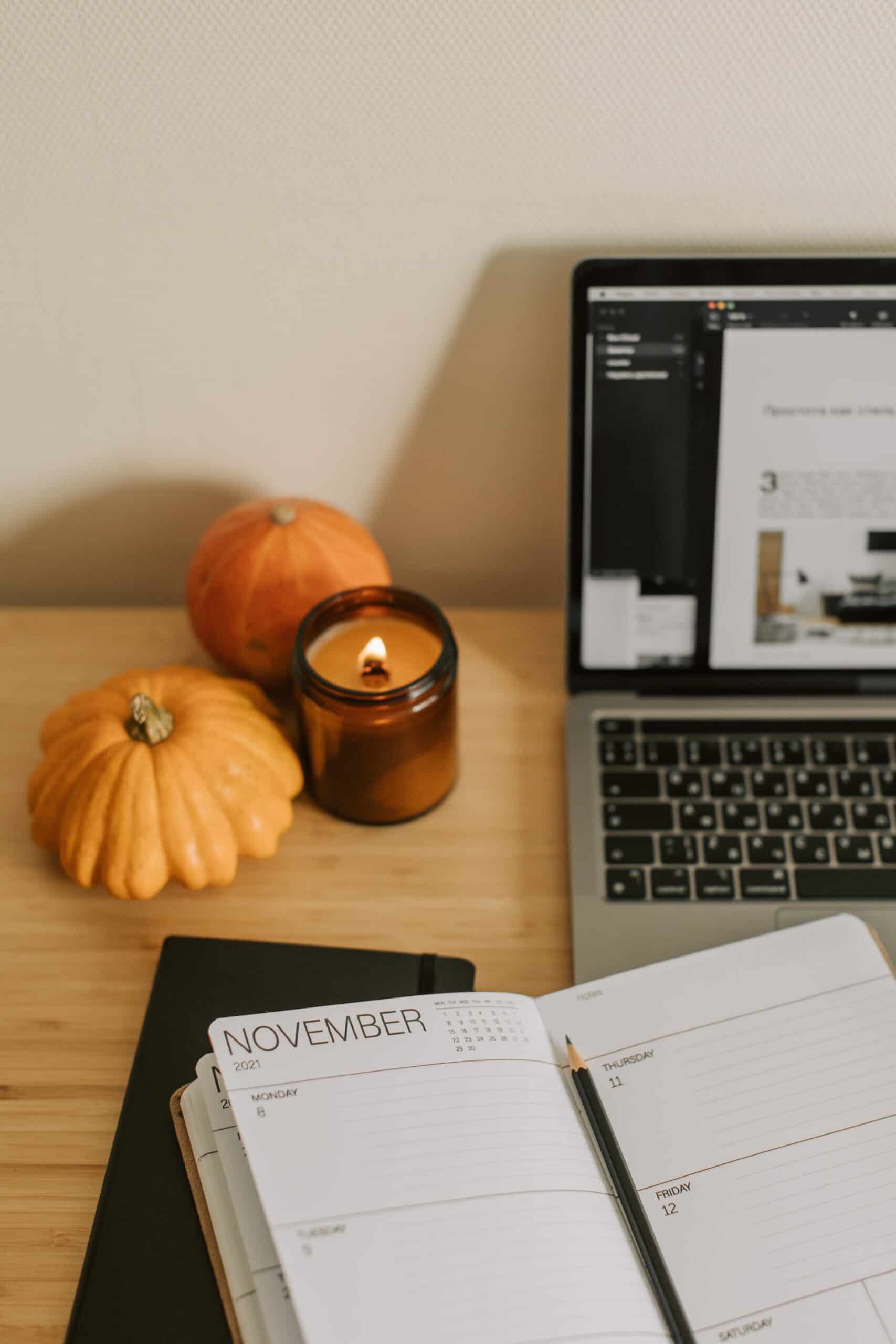You’ve had your coffee. You’ve technically rested. And yet your brain still feels fried. Virtually no thoughts. Just empty.
Everything feels foggy. You keep forgetting what you were doing mid-task.
At its worst, you’re not even sure if you’re tired, overwhelmed, overstimulated, or all of the above.
Welcome to the joy of ADHD fatigue.
If your energy crashes before noon and the idea of “trying harder” makes you want to cry into your planner, this post is for you. Let’s talk about what’s actually happening and how to reset without hustling your way into another spiral.
Why ADHD Fatigue Hits Harder in the Fall
Why does Fall hit so weird?
Because the combo of shorter days, shifting routines, and upcoming holidays basically creates the perfect storm for ADHD burnout.
You’re getting less daylight (hello, melatonin overload), your routines are shifting again post-summer, and you’re probably thinking about five holidays at once even if you haven’t planned anything yet.
Last week, I opened my planner to “review my fall intentions.” Fifteen minutes later, I had made a new Spotify playlist, reorganized my pens, and somehow ordered soup dumplings. Productivity: 0. Dopamine: 10/10.
One minute you’re “locking in for Q4,” and the next you’re lying on your couch, wondering why walking to the sink feels like a full-body workout.
This is different from ADHD decision fatigue (which is also a thing). Here’s the nitty-gritty.
Quick Breakdown:
- Less sunlight = dopamine drop
- Executive dysfunction + overstimulation = full mental workload by 11 AM
- Seasonal transitions = new tasks, new decisions, new brain clutter
Here’s the thing: ADHD doesn’t only struggle with attention. It spends energy managing attention. And that adds up fast.
5 (Extremely Doable) Ways to Recharge Your ADHD Brain
You don’t need a wellness plan. Although that can be nice. However, a snack, a nap, and maybe five minutes of peace can do an unbelievable amount of good.
These are low-effort, high-impact energy resets for when your brain feels like dial-up internet in a 5G world.
1. Step Outside for 5 Minutes
Yes, even if it’s cloudy. Natural light helps shakes up your internal clock and gently boosts dopamine.
Think of it as giving your brain a screen break from being inside your own skull.
Pro tip: Stand by a window if you can’t actually go outside. The light, whatever it is, still counts. I promise.
2. Scribble Down What’s in Your Head
It’s a well-known tip, but it works! Scribbling out even one messy page in a notebook (or a chaotic voice memo) can calm the mental noise.
This isn’t journaling. It’s a brain declutter (AKA brain dump).
Think: less “dear diary,” more “mental screenshot.”
Half the time, I start writing a grocery list and end up realizing I just needed to get the random chaos out of my brain.
3. Eat Some Protein (Right Now Would Be Good)
If you’re dizzy, foggy, or unreasonably mad at a small inconvenience, check your snack situation.
ADHD brains often forget to eat or misread hunger cues. That “low motivation” might actually be low blood sugar.
Grab a string cheese, a boiled egg, or a handful of nuts. (Yes, a handful of Goldfish counts if that’s what’s available.)
Your brain literally runs on glucose and amino acids. So feed it before it files a complaint.
4. Go Full Airplane Mode for 10 Minutes
Silence is underrated. Especially when you’re dealing with ADHD fatigue.
Turn off notifications, toss your phone across the couch, and just sit there. Even if your brain protests.
Stare out the window. Stretch. Breathe. Daydream about doing nothing on purpose.
It’s like hitting the “refresh” button on your nervous system without needing a meditation app to guilt you about it.
5. Do One Tiny, Tactile Task
Fold a dish towel. Wipe the counter. Change your socks.
These micro-actions give your brain a hit of closure and dopamine without draining energy.
Bonus points if you pair it with music, a podcast, or your “main character cleaning montage” playlist.
True story: I once broke a spiral of ADHD fatigue by just wiping down my desk. Ten minutes later, I had enough momentum to unload the dishwasher. Small wins count.
Gentle Reminder: Tired Doesn’t Equal Broken.
If you’ve been blaming yourself for not having energy, stop. ADHD fatigue is legit.
Let’s face it, you’re a person whose brain runs a little hotter and faster than most and sometimes it overheats.
It’s physics, babe.
So instead of “fixing” your fatigue with another productivity hack, try this instead:
- Rest before you crash.
- Celebrate micro wins.
- Trust that small resets can bring you back online.
Because the truth is, your ADHD brain isn’t broken. You, and your brain, are just tired. And that’s something you can work with.

You’re not just tired. You’re wired *and* tired.
Real-Life
Work in Progress.
Founder. Writer.
Roxy is the creator of The Everyday Flourish, a relatable personal growth blog for women who are tired of burnout, chaos, and hustle culture.
A recovering overthinker and unofficial life guinea pig, she shares honest self-care strategies, ADHD-friendly productivity tips, and mindset shifts that actually feel doable.
Around here, personal growth comes with grace, not pressure - and a lot fewer to-do lists.




